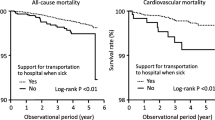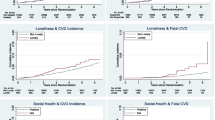Abstract
Objectives
Among older Canadians, we examined the influence of low social support, a weak sense of belonging, and living alone to understand their role on mortality risk in Canada.
Methods
We conducted a retrospective cohort study of older Canadians surveyed in 2001 from the Canadian Community Health Survey and followed up with death events through December 31, 2011 from the Canadian Vital Statistics Database. Analyses were stratified by age: 55–64 and 65 and older. Social support was assessed using measures developed for the Medical Outcomes Study. A sense of belonging, a binary measure, measured community integration. Living alone was a binary measure. Survival analysis was applied using a Cox proportional hazards model, adjusted for age, sex, income, smoking, and frailty.
Results
Among respondents 55–64 (n = 6822), low affection (HR = 1.37; 95% CI 1.07, 1.75), low emotional/informational support (HR = 1.36; 95% CI 1.06, 1.74), and low positive social interactions (HR = 1.36; 95% CI 1.06, 1.75) were associated with mortality risk. Among respondents 65 and older (n = 8966), low affection (HR = 1.17; 95% CI 1.04, 1.31), low positive social interactions (HR = 1.20; 95% CI 1.07, 1.34), low emotional/informational support (HR = 1.19; 95% CI 1.06, 1.33), and a weak sense of belonging (HR = 1.13; 95% CI 1.05, 1.22) were associated with mortality risk.
Conclusion
Low social support and a weak sense of belonging are important risk factors among older Canadians and should be part of the dialogue in Canada about their roles in healthy aging.
Résumé
Objectifs
Chez les Canadiens âgés, nous avons examiné l’influence du faible soutien social, du faible sentiment d’appartenance et du fait de vivre seul pour en comprendre le rôle sur le risque de mortalité au Canada.
Méthode
Nous avons mené une étude de cohorte rétrospective des Canadiens âgés sondés en 2001 dans l’Enquête sur la santé dans les collectivités canadiennes et fait un suivi avec les décès survenus jusqu’au 31 décembre 2011 d’après la Base canadienne de données sur l’état civil. Nos analyses ont été stratifiées selon l’âge : 55 à 64 ans et 65 ans et plus. Le soutien social a été évalué à l’aide d’indicateurs élaborés pour l’étude Medical Outcomes Study. Le sentiment d’appartenance, un indicateur binaire, a mesuré l’intégration dans la communauté. Le fait de vivre seul était aussi un indicateur binaire. Nous avons appliqué une analyse de survie à l’aide du modèle des risques proportionnels de Cox en apportant des ajustements selon l’âge, le sexe, le revenu, le tabagisme et la fragilité.
Résultats
Chez les répondants de 55 à 64 ans (n = 6822), le peu d’affection (RC = 1,37, IC de 95% : 1,07, 1,75), le peu d’appui émotionnel/informationnel (RC = 1,36, IC de 95% : 1,06, 1,74) et le peu d’interactions sociales positives (RC = 1,36, IC de 95% : 1,06, 1,75) étaient associés au risque de mortalité. Chez les répondants de 65 ans et plus (n = 8966), le peu d’affection (RC = 1,17, IC de 95% : 1,04, 1,31), le peu d’interactions sociales positives (RC = 1,20, IC de 95% : 1,07, 1,34), le peu d’appui émotionnel/informationnel (RC = 1,19, IC de 95% : 1,06, 1,33) et le faible sentiment d’appartenance (RC = 1,13, IC de 95% : 1,05, 1,22) étaient associés au risque de mortalité.
Conclusion
Le peu de soutien social et le faible sentiment d’appartenance sont d’importants facteurs de risque chez les Canadiens âgés et devraient faire partie du dialogue au Canada sur leur rôle dans le vieillissement sain.








Similar content being viewed by others
References
Berkman, L. F., Melchior, M., Chastang, J.-F., Niedhammer, I., Leclerc, A., & Goldberg, M. (2004). Social integration and mortality: a prospective study of French employees of Electricity of France–Gas of France The GAZEL Cohort. American Journal of Epidemiology, 159(2), 167–174.
Birkeland, A., & Natvig, G. K. (2009). Coping with ageing and failing health: a qualitative study among elderly living alone. International Journal of Nursing Practice, 15(4), 257–264.
Cloutier-Fisher, D., Kobayashi, K., & Smith, A. (2011). The subjective dimension of social isolation: a qualitative investigation of older adults’ experiences in small social support networks. Journal of Aging Studies, 25(4), 407–414.
Curtis, J., & McMullin, J. (2016). Older workers and the diminishing return of employment: changes in age-based income inequality in Canada, 1996–2011. Work, Aging and Retirement, 2(3), 359–371.
Ellwardt, L., van Tilburg, T., Aartsen, M., Wittek, R., & Steverink, N. (2015). Personal networks and mortality risk in older adults: a twenty-year longitudinal study. PLoS One, 10(3), e0116731.
Gustavson, K., & Lee, C. D. (2004). Alone and content: frail seniors living in their own home compared to those who live with others. Journal of Women & Aging, 16(3–4), 3–18.
Hawton, A., Green, C., Dickens, A. P., Richards, S. H., Taylor, R. S., Edwards, R., Greaves, C. J., & Campbell, J. L. (2011). The impact of social isolation on the health status and health-related quality of life of older people. Quality of Life Research, 20(1), 57–67.
Holt-Lunstad, J., Smith, T. B., & Bradley Layton, J. (2010). Social relationships and mortality risk: a meta-analytic review. PLoS Medicine, 7(7), e1000316.
Holt-Lunstad, J., Smith, T. B., Baker, M., Harris, T., & Stephenson, D. (2015). Loneliness and social isolation as risk factors for mortality: a meta-analytic review. Perspectives on Psychological Science, 10(2), 227–237.
Hoover, M., Rotermann, M., Sanmartin, C., & Bernier, J. (2013). Validation of an index to estimate the prevalence of frailty among community-dwelling seniors. Health Reports, 24(9), 10–17.
Kitchen, P., Williams, A., & Chowhan, J. (2012). Sense of community belonging and health in Canada: a regional analysis. Social Indicators Research, 107(1), 103–126.
Klinenberg, E. (2012). Going solo : the extraordinary rise and surprising appeal of living alone. New York: Penguin Press.
Lyyra, T.-M., & Heikkinen, R.-L. (2006). Perceived social support and mortality in older people. The Journals of Gerontology. Series B, Psychological Sciences and Social Sciences, 61(3), S147–S152.
McCann, M., Donnelly, M., & O'Reilly, D. (2011). Living arrangements, relationship to people in the household and admission to care homes for older people. Age and Ageing, 40(3), 358–363.
McLaren, S., Gomez, R., Bailey, M., & Van Der Horst, R. K. (2007). The association of depression and sense of belonging with suicidal ideation among older adults: applicability of resiliency models. Suicide & Life-Threatening Behavior, 37(1), 89–102.
Moore, E., & Rosenberg, M. (2001). Canada's elderly population: The challenges of diversity. The Canadian Geographer/Le Géographe canadien, 45(1), 145–150.
Organization for Economic Development. (2016). Poverty rate. accessed October 17. https://data.oecd.org/inequality/poverty-rate.htm. Accessed 3 Nov 2017.
Penninx, B. W., van Tilburg, T., Kriegsman, D. M., Deeg, D. J., Boeke, A. J., & van Eijk, J. T. (1997). Effects of social support and personal coping resources on mortality in older age: the Longitudinal Aging Study Amsterdam. American Journal of Epidemiology, 146(6), 510–519.
Rodriguez-Laso, A., Zunzunegui, M. V., & Otero, A. (2007). The effect of social relationships on survival in elderly residents of a southern European community: a cohort study. BMC Geriatrics, 7(1), 19.
Ross, N. (2002). Community belonging and health. Health Reports, 13(3), 33–39.
Sanmartin, C., Decady, Y., Trudeau, R., Dasylva, A., Tjepkema, M., Finès, P., Burnett, R., Ross, N., & Manuel, D. G. (2016). Linking the Canadian Community Health Survey and the Canadian Mortality Database: an enhanced data source for the study of mortality. Health Reports, 27(12), 10.
Sherbourne, C. D., & Stewart, A. L. (1991). The MOS social support survey. Social Science & Medicine, 32(6), 705–714.
Statistics Canada. (2017a). Age and sex, and type of dwelling data: key results from the 2016 Census. The Daily. https://www150.statcan.gc.ca/n1/daily-quotidien/170503/dq170503a-eng.htm. Accessed 21 Apr 2019.
Statistics Canada. (2017b). Families, households and marital status: key results from the 2016 Census. The Daily. https://www150.statcan.gc.ca/n1/daily-quotidien/170802/dq170802a-eng.htm. Accessed 21 Apr 2019.
Statistics Canada. (2017c). A portrait of the population aged 85 and older in 2016 in Canada. Statistics Canada, accessed April 21. https://www12.statcan.gc.ca/census-recensement/2016/as-sa/98-200-x/2016004/98-200-x2016004-eng.cfm.
Statistics Canada. (2017d). Vital statistics - death database (CVSD). accessed April 21. http://www23.statcan.gc.ca/imdb/p2SV.pl?Function=getSurvey&SDDS=3233.
Statistics Canada. (2018). Canadian community health survey - annual component (CCHS). accessed April 21. http://www23.statcan.gc.ca/imdb/p2SV.pl?Function=getSurvey&SDDS=3226.
Stringhini, S., Berkman, L., Dugravot, A., Ferrie, J. E., Marmot, M., Kivimaki, M., & Singh-Manoux, A. (2012). Socioeconomic status, structural and functional measures of social support, and mortality the British Whitehall II cohort study, 1985–2009. American Journal of Epidemiology, 175(12), 1275–1283.
Uchino, B. N. (2009). Understanding the links between social support and physical health: a life-span perspective with emphasis on the separability of perceived and received support. Perspectives on Psychological Science, 4(3), 236–255.
Victor, C., Scambler, S., Bond, J., & Bowling, A. (2000). Being alone in later life: loneliness, social isolation and living alone. Reviews in Clinical Gerontology, 10(4), 407–417.
Acknowledgements
Funding for this project was provided by the Canadian Institutes of Health Research, the Fonds de Recherche du Québec - Santé, and the Institute for Health and Social Policy of McGill University.
Author information
Authors and Affiliations
Corresponding author
Ethics declarations
Conflict of interest
The authors declare that they have no conflict of interest.
Additional information
Publisher’s note
Springer Nature remains neutral with regard to jurisdictional claims in published maps and institutional affiliations.
Rights and permissions
About this article
Cite this article
Renwick, K.A., Sanmartin, C., Dasgupta, K. et al. The influence of low social support and living alone on premature mortality among aging Canadians. Can J Public Health 111, 594–605 (2020). https://doi.org/10.17269/s41997-020-00310-9
Received:
Accepted:
Published:
Issue Date:
DOI: https://doi.org/10.17269/s41997-020-00310-9




